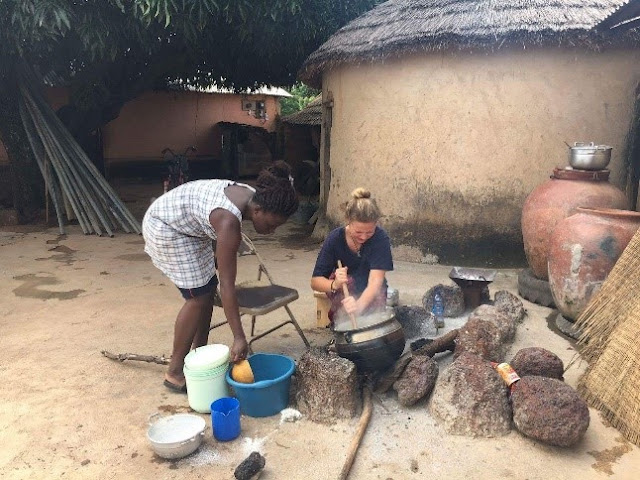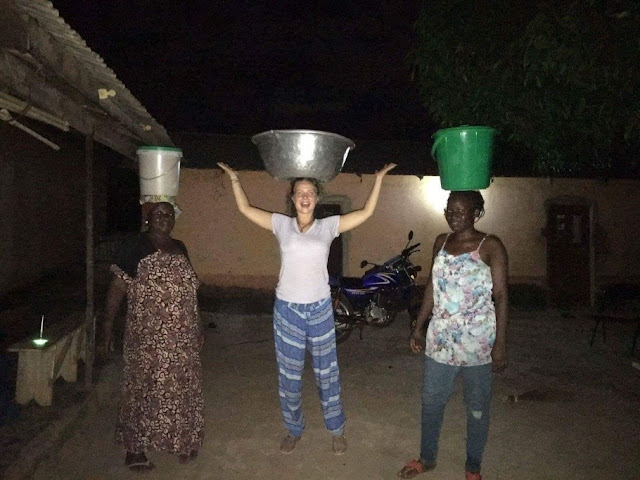 |
Team NFED and Team TradeAID - Upper East Region, Ghana
(Picture by Emilio Dellanzo) |
International
Youth Day 2017 is dedicated to celebrating young people’s contributions to
conflict prevention and transformation as well as inclusion, social justice,
and sustainable peace. The process of social inclusion for youth, including
participation in decision-making as well as access to quality education, health
care and basic services promotes their role as active contributors to society
and affords young people with opportunities to reach their potential and
achieve their goals.
Today we
celebrate Youth, and how young people have the potential to change their
present and future for the better. Inspiration comes in all shapes and sizes.
You don’t have to be born rich, super intelligent or beautiful to inspire, you
just have to believe in yourself and follow your dreams.
Allow me to
share a brief piece of one of my favourite inspiring books:
The preparation was complete, so I waited.
The muscles in my arms still burned from having worked so hard, but now I was
finished. The machinery was bolted and secured. The tower was steady and
unmoving under the weight of twisted steel and plastic. Looking at it now, it
appeared exactly as it was – something out of a dream.
News of the machine had spread to the
villages, and people were starting to arrive. The traders spotted it from their
stalls and packed up their things. The truckers left their vehicles along the
roads. Everyone walked into the valley, and now gathered in its shadow. I
recognized these faces. Some of these people had mocked me for months, and
still they whispered, even laughed. More of them were coming. It was time.
Balancing the small reed and wires in my
left hand, I used the other to pull myself onto the tower’s first rung. The
soft wood groaned under my weight, and the compound fell silent. I continued to
climb, slowly and assuredly, until I was facing the machine’s crude frame. Its
plastic arms were burned and blackened, its metal bones bolted and welded into
place. I paused and studied the flecks of rust and paint, how they appeared
against the fields and mountains beyond. Each piece told its own tale of
discovery, of being lost and found in a time of hardship and fear. Finally
together now, we were all being reborn.
Two wires dangled from the heart of the
machine and gently danced in the breeze. I knotted their frayed ends together
with the wires that sprouted off the reed, just as I’d always pictured. Down
below, the crowd cackled like a gang of birds.
“Quiet down,” someone said. “Let’s see how
crazy this boy really is.”
A sudden gust muffled the voices below, then
picked up into a steady wind. It took hold of my T-shirt and whistled through
the tower rungs. Reaching over, I removed a bent piece of wire that locked the
machine’s spinning wheel in place. Once released, the wheel and arms began to
turn. They spun slowly at first, then faster and faster, until the force of
their motion rocked the tower. My knees buckled, but I held on.
Don’t let me down.
I gripped the reed and wires and waited for
the miracle. Finally it came, at first a tiny light flickered from my palm,
then a surging magnificent glow. The crowd gasped and shuddered. The children
pushed for a better look.
“It’s true!” someone said.
“Yes,” said another. “The boy has done it.”
(W. Kamkwamba & Bryan Mealer, 2009, The Boy Who Harnessed the Wind, Harper Collins)
William
Kamkwanba was born in Malawi, a country where magic ruled and modern science
was mystery. It was also a land withered by drought and hunger. But William had
read about windmills, and he dreamed of building one that would bring to his
small village a set of luxuries that only 2 percent of Malawians could enjoy:
electricity and running water. His neighbours called him misala-crazy-but William refused to let go of his dreams. With a
small pile of once-forgotten science textbooks; some scrap metal, tractor parts
and bicycle halves; and an armoury of curiosity and determination, he embarked
on a daring plan to forge an unlikely contraption and small miracle that would
change the lives around him.
The Boy Who Harnessed the Wind is a book
on the remarkable true story of a young boy who was denied the privilege of
going to school, but refused to give up on his dreams. Written by William
Kamkwamba himself and Bryan Mealer, it is a story that will inspire anyone to
believe in their ability to better the lives of those around them and make a
lasting impact.
William
Kamkwamba is a perfect example of how young minds, who still have the courage
to believe and chase their dreams, can change the world for the better. This
book has been an inspiration to me and reminds me every day of how our greatest
challenges are also our biggest blessings in disguise.
As a Team
Leader in Ghana, working in an unfamiliar environment, managing a team of
individuals from a mix of diverse cultures and backgrounds, challenges are inevitable.
Rather than see these as obstacles, however, I have chosen to see these as
opportunities for me to develop my leadership skills, thus improve my own
personal development.
And the best
part about being a Team Leader, thus having to constantly monitor the progress
of team, is that I get to clearly see how everyone in the team grows and
develops over time. Sometimes I see it before they even do, which I can’t help
but smile at. I have witnessed communication skills, computer skills, research
and reporting skills, presentation skills, cross cultural learning skills and
teaching skills all improve drastically within the team over the last 5 weeks,
and this excites me because it reminds me every day that this will have an
enormous impact on the lives of those we work with here in Ghana, but also on
their own lives and futures. And that is exactly why we celebrate International
Youth Day, because what we do whilst we are young, will determine who we become
in the future and the world we will live in.
Written by: Emilio Dellanzo (NFED- KUMBUNGU Team leader)










